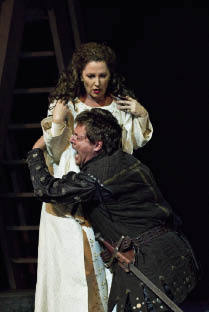
Francesca da Rimini
La forza del destino
Opera Holland Park, in rep until 14 August
Tristan und Isolde Act II
Royal Albert Hall
Opera Holland Park makes a speciality of reviving Italian operas of the early 20th century, often absurdly and lazily dubbed ‘verismo’. Its latest, and possibly most courageous effort on this front, is Zandonai’s Francesca da Rimini, which, far from conforming to the aesthetic brilliantly outlined in the sung Prologue to I Pagliacci, takes a subject very far removed from quotidian life, and decked out in the almost fatally pretentious language of D’Annunzio.
The story is taken from Canto V of Dante’s Inferno, with the adulterers, a wholly sympathetic pair, unwisely reading about Lancelot and Guinevere, until their eyes meet, and ‘we read no more that afternoon’. Francesca has been tricked into marriage with the hideously disabled Gianciotto, who sends his handsome brother Paolo il bello, who colludes in the deceit that he will be Francesca’s bridegroom. D’Annunzio, an early campaigner against political correctness, whatever else you may think of him, invents a third brother, brave but also disfigured, who spies on the lovers and reports back to Gianciotto, with the result that led Dante to faint: eternal justice demands that they are doomed to perpetual torment, after having been brutally murdered. This queasily sub-post-Wagnerian plot elicited just the right kind of music from Zandonai, who was never again to find so congenial a tale of passion and brutality.
OHP’s production and performance is virtually ideal. On the opening night the Gianciotto of Jeffrey Black seemed to be dogged by a throat infection, and higher notes were strangulated. But Julian Gavin’s Paolo was ruggedly magnificent, and above all the Francesca of Cheryl Barker would be luxury casting anywhere in the world. Francesca sings almost continuously, and nothing was too much of a challenge for Barker, radiant in appearance and voice throughout. The ingenious stage designs meant that it was always clear where the action was and exactly what was going on, and though the score’s tiresome mannerisms, such as patches of pseudo-medievalism, intermittently hold things up, the alternation of delicacy, mellifluous lyricism — Francesca’s attendants have enchanting music — surging and increasingly urgent passion, and violent destructiveness make for a fascinating and involving evening. It’s a mistake to try to assimilate Zandonai to any other composer, though his debts to his forebears and contemporaries are obvious: but the net result couldn’t be anyone else. The flaw, not fatal here, but certainly in his later operas, is his incapacity to write a memorable melody. His contemporaries across the Alps, Zemlinsky and Schreker especially, were similarly afflicted. But it would be the rankest snobbery to prefer them to him. I hope this production is revived, since we are very unlikely to get another.
Less welcome, to me, was OHP’s first staging of Verdi’s La forza del destino. Anyone who claims that no plot is too absurd to be redeemed by good music is decisively refuted by Forza, ramshackle even by Verdi’s standards. It’s no good dubbing it ‘epic’ as if that excused the insertion of any old nonsense and the omission of what would be vital scenes. Fate is characterised by its undevelopable motif, but nothing else is characterised at all. OHP’s director Martin Duncan gave up and had the opera taking place nowhere and nowhen. The conducting of Stuart Stratford is propulsive, the orchestra once more playing superbly. And the heroine, another Leonora, is interestingly sung by Gweneth-Anne Jeffers. At present she has two or even three voices that need to be connected, but the highest and loudest of them is thrilling, if pitch-unreliable. Peter Auty makes a slightly underpowered partner for her, while Mark Stone is an unusually attractive avenger. This opera always makes me long for the old days of LP highlights records, which gave you up to an hour of great listening and dispensed with spirited gypsies and their ilk.
I must briefly mention the phenomenal performance of Act II of Tristan und Isolde at the Proms last Sunday. Simon Rattle is an unreliable Wagnerian, but here he was great. Working with the Orchestra of the Age of Enlightenment he delivered an account of this difficult act, almost always a disappointment in the theatre, which penetrated to the heart of its overwhelming greatness and originality. And that despite the alarming weakness of Ben Heppner’s Tristan, his voice cracking if he attempted to sing quietly: that meant that his invitation to Isolde to follow him at the end of the act went for little. Violeta Urmana, by contrast, is developing into a fine Isolde, and Franz-Josef Selig was a youthful Marke, virile and outraged. And Sarah Connolly had in Brangäne a role which suits her perfectly. Her warning, delivered from close to the Albert Hall’s organ, had me in tears. What was extraordinary was the cumulative waves of sound Rattle drew from his orchestra, sounding leaner than one is used to, audaciously modern, and both terrifying and moving. Wagner was afraid that a good performance of Tristan might drive people mad. This came dangerously near to that.






Comments